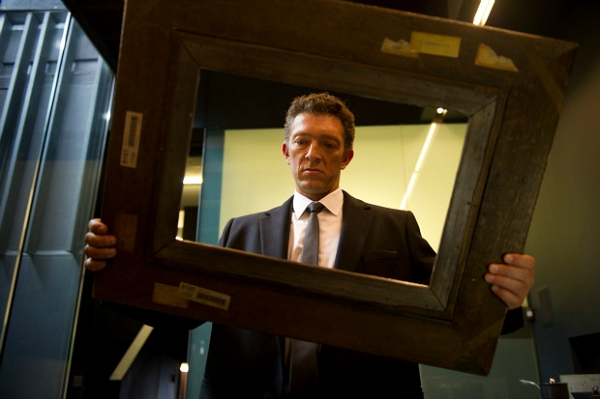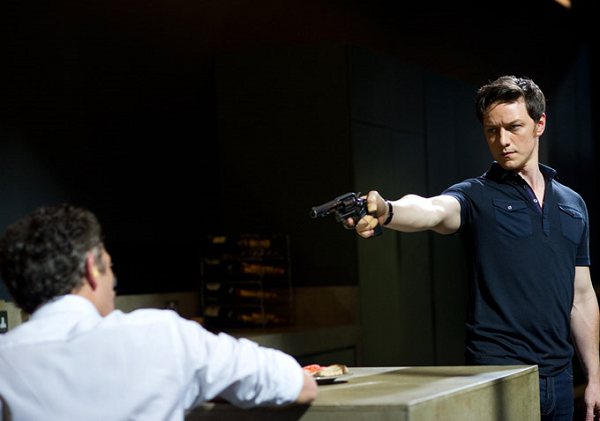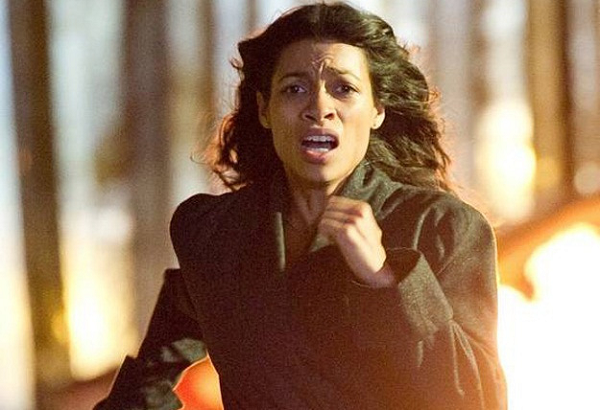Trance Review: Danny Boyle Excels Once Again
Danny Boyle has had a bumper few years, earning an Oscar for
Slumdog Millionaire, making his dream project,
127 Hours and earned massive praise for the 2012 London Olympic opening ceremony. After years away, he has returned to making a British set movie with
Trance, which pleases as both a mainstream crime-thriller and a more cerebral psychological thriller.
At a London art auction, Frank (Vincent Cassel) and his crew attempt to steal a painting valued at $25 Million. Simon (James McAvoy) is hailed as a hero when he tries to stop the heist and gets hit in the head for trouble. But Simon was the inside man for the heist and suffers amnesia, due to the blow he received during the action. When Frank discovers he does not have the painting, he becomes determined to find out where it is, by any means necessary. When torturing Simon does not work, Frank turns to more unusual techniques and makes Simon see a hypnotherapist, Elizabeth Lamb (Rosario Dawson) and forces everyone involved down a dark and twisted path.

Boyle reunites with writer John Hodge and
Trance does feel very much like an early Boyle movie. Like
Shallow Grave and
Trainspotting,
Trance focuses on people on the fringes of the criminal world, who get embroiled into much wider scheme and get in over their heads. The movie starts with a great heist sequence and has at the start a slightly darker comic tone before turning into a fast paced thriller.
As expected
Trance has all the visual flair you want from a Danny Boyle movie, with all the cross cutting between flashbacks and the present time and Boyle does gets to play around with the dreamscape.
Trance also serves as a great example of how a music score can amplify the action on the screen, being a fast and pumping when the action picks up to being calm and tranquil for the hypnotist sequences. Boyle does get to audience absorbed into his dream worlds with his use lens flare, camera movement and music.
 Trance
Trance is similar to other thrillers like
Memento and
The Machinist, twisting and turning constantly. Boyle starts the movie as a heist flick and then slowly turns the genre gears and turns the film into a psychological thriller. Like Christopher Nolan, Boyle and his writers set out to explore themes of memories, relationships, manipulation and trust and it was done to an expect level. Throughout the movie, it changes courses constantly, leaving to the audience guessing: but Boyle and the writers do leave some clues about the eventual ending and I am sure there's more to the film, during a second viewing.
The characters themselves are also enigmas, as their motivations change and we get to see more pieces of the puzzle. Simon starts off as a victim but as the movie progresses, we see his dark and twisted side and McAvoy effectively brings this out of his character. He was much better fitted for this role, than his recent action anti-hero role in
Welcome to the Punch. On a whole, the characters are generally unsympathetic and the movie constantly shifts both its focus and who the audience should root for. But added to the movie’s theme of who we are meant to trust as relationships, the motives in the film that shift along coincide with its themes and makes some sense overall.

Whilst
Trance is a fun ride, people might begin to see multiple plot holes and raise questions about how characters know certain actions and reactions were going to happen. But it can be argued that
The Dark Knight Rises had plot problems, if you held it to any form of analysis and people still enjoyed that movie. The aim of Boyle and the writers was to focus on the themes and how the puzzle fit together once you get more information, even if the foundation itself is a little shaky.
Trance is a highly entertaining and engaging crime and psychological thriller. It is a fun ride as it brinks through its 101 minute running time. Whilst there are some logic and logistical problems in the plot when everything is revealed, it is still a well made movie that explores the themes of memory, trust and the framework of the mind. Fans of Boyle’s previous work will certainly be pleased.
 Boyle reunites with writer John Hodge and Trance does feel very much like an early Boyle movie. Like Shallow Grave and Trainspotting, Trance focuses on people on the fringes of the criminal world, who get embroiled into much wider scheme and get in over their heads. The movie starts with a great heist sequence and has at the start a slightly darker comic tone before turning into a fast paced thriller.
As expected Trance has all the visual flair you want from a Danny Boyle movie, with all the cross cutting between flashbacks and the present time and Boyle does gets to play around with the dreamscape. Trance also serves as a great example of how a music score can amplify the action on the screen, being a fast and pumping when the action picks up to being calm and tranquil for the hypnotist sequences. Boyle does get to audience absorbed into his dream worlds with his use lens flare, camera movement and music.
Boyle reunites with writer John Hodge and Trance does feel very much like an early Boyle movie. Like Shallow Grave and Trainspotting, Trance focuses on people on the fringes of the criminal world, who get embroiled into much wider scheme and get in over their heads. The movie starts with a great heist sequence and has at the start a slightly darker comic tone before turning into a fast paced thriller.
As expected Trance has all the visual flair you want from a Danny Boyle movie, with all the cross cutting between flashbacks and the present time and Boyle does gets to play around with the dreamscape. Trance also serves as a great example of how a music score can amplify the action on the screen, being a fast and pumping when the action picks up to being calm and tranquil for the hypnotist sequences. Boyle does get to audience absorbed into his dream worlds with his use lens flare, camera movement and music.
 Trance is similar to other thrillers like Memento and The Machinist, twisting and turning constantly. Boyle starts the movie as a heist flick and then slowly turns the genre gears and turns the film into a psychological thriller. Like Christopher Nolan, Boyle and his writers set out to explore themes of memories, relationships, manipulation and trust and it was done to an expect level. Throughout the movie, it changes courses constantly, leaving to the audience guessing: but Boyle and the writers do leave some clues about the eventual ending and I am sure there's more to the film, during a second viewing.
The characters themselves are also enigmas, as their motivations change and we get to see more pieces of the puzzle. Simon starts off as a victim but as the movie progresses, we see his dark and twisted side and McAvoy effectively brings this out of his character. He was much better fitted for this role, than his recent action anti-hero role in Welcome to the Punch. On a whole, the characters are generally unsympathetic and the movie constantly shifts both its focus and who the audience should root for. But added to the movie’s theme of who we are meant to trust as relationships, the motives in the film that shift along coincide with its themes and makes some sense overall.
Trance is similar to other thrillers like Memento and The Machinist, twisting and turning constantly. Boyle starts the movie as a heist flick and then slowly turns the genre gears and turns the film into a psychological thriller. Like Christopher Nolan, Boyle and his writers set out to explore themes of memories, relationships, manipulation and trust and it was done to an expect level. Throughout the movie, it changes courses constantly, leaving to the audience guessing: but Boyle and the writers do leave some clues about the eventual ending and I am sure there's more to the film, during a second viewing.
The characters themselves are also enigmas, as their motivations change and we get to see more pieces of the puzzle. Simon starts off as a victim but as the movie progresses, we see his dark and twisted side and McAvoy effectively brings this out of his character. He was much better fitted for this role, than his recent action anti-hero role in Welcome to the Punch. On a whole, the characters are generally unsympathetic and the movie constantly shifts both its focus and who the audience should root for. But added to the movie’s theme of who we are meant to trust as relationships, the motives in the film that shift along coincide with its themes and makes some sense overall.
 Whilst Trance is a fun ride, people might begin to see multiple plot holes and raise questions about how characters know certain actions and reactions were going to happen. But it can be argued that The Dark Knight Rises had plot problems, if you held it to any form of analysis and people still enjoyed that movie. The aim of Boyle and the writers was to focus on the themes and how the puzzle fit together once you get more information, even if the foundation itself is a little shaky.
Trance is a highly entertaining and engaging crime and psychological thriller. It is a fun ride as it brinks through its 101 minute running time. Whilst there are some logic and logistical problems in the plot when everything is revealed, it is still a well made movie that explores the themes of memory, trust and the framework of the mind. Fans of Boyle’s previous work will certainly be pleased.
Whilst Trance is a fun ride, people might begin to see multiple plot holes and raise questions about how characters know certain actions and reactions were going to happen. But it can be argued that The Dark Knight Rises had plot problems, if you held it to any form of analysis and people still enjoyed that movie. The aim of Boyle and the writers was to focus on the themes and how the puzzle fit together once you get more information, even if the foundation itself is a little shaky.
Trance is a highly entertaining and engaging crime and psychological thriller. It is a fun ride as it brinks through its 101 minute running time. Whilst there are some logic and logistical problems in the plot when everything is revealed, it is still a well made movie that explores the themes of memory, trust and the framework of the mind. Fans of Boyle’s previous work will certainly be pleased.